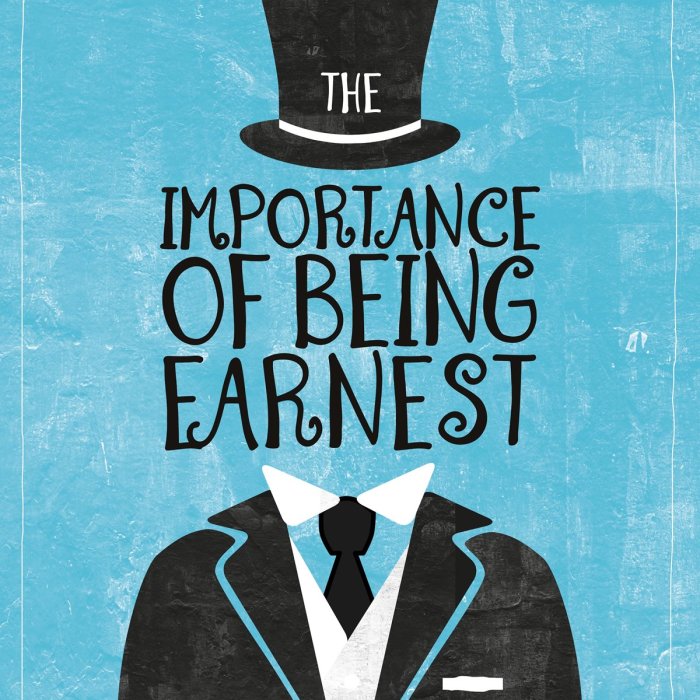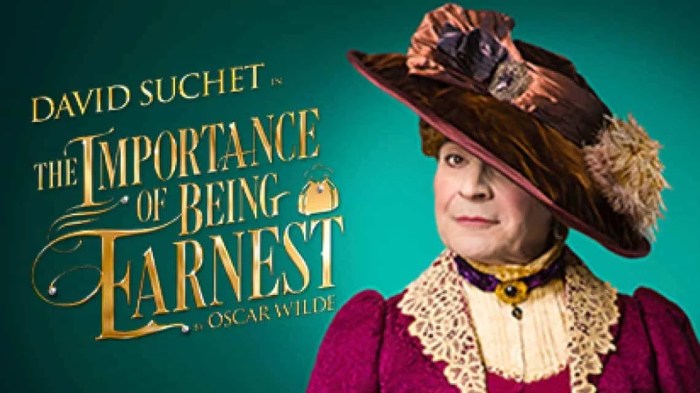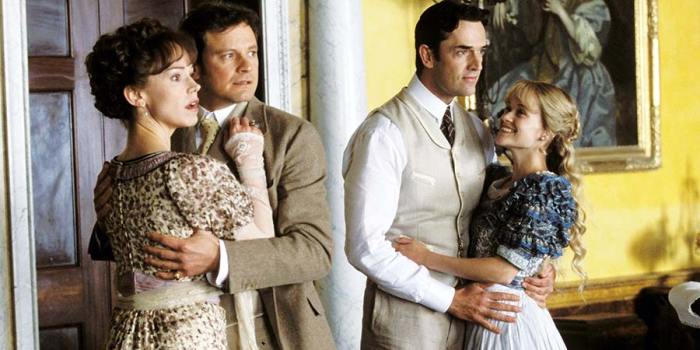The importance of being earnest play script – Oscar Wilde’s “The Importance of Being Earnest” stands as a seminal play script, captivating audiences with its wit, social commentary, and exploration of identity. Set against the backdrop of Victorian society, the play delves into the complexities of social class, the pursuit of pleasure, and the nature of truth.
Through its unforgettable characters and intricate plot, “The Importance of Being Earnest” invites us to question societal norms and embrace the power of self-expression.
Introduction

Oscar Wilde’s “The Importance of Being Earnest” is a play script that stands as a significant contribution to English literature. It is renowned for its witty dialogue, intricate plot, and exploration of social themes.
The play premiered in 1895 during the Victorian era, a time marked by strict social conventions and class divisions. Wilde’s play satirizes these norms, offering a critique of the superficiality and hypocrisy prevalent in society.
Characters and Themes

Characters
- John Worthing, also known as Jack, is a young gentleman who creates an alter ego named Ernest to escape his country life.
- Algernon Moncrieff is Jack’s friend, who also uses a false identity, Bunbury, to avoid social obligations.
- Lady Bracknell is Algernon’s aunt, a formidable and judgmental woman who represents the Victorian social elite.
- Gwendolen Fairfax is Lady Bracknell’s daughter, who is initially engaged to Jack but falls in love with Ernest.
- Cecily Cardew is Jack’s ward, who is attracted to Ernest but discovers his true identity.
Themes
- Identity and Deception:The play explores the nature of identity and the consequences of deception, as the characters use alter egos to navigate society.
- Social Class:Wilde satirizes the rigid class structure of Victorian society, highlighting the absurdity of its conventions.
- The Pursuit of Pleasure:The characters are driven by a desire for pleasure, which leads them to engage in frivolous activities and neglect their responsibilities.
- Epigrams:Concise and clever statements that offer insights into human nature.
- Paradoxes:Statements that appear contradictory but contain a deeper truth.
- Alliteration:The repetition of consonant sounds in close succession, creating a pleasing rhythmic effect.
- Act I:Introduces the main characters and their relationships, setting the stage for the ensuing chaos.
- Act II:The plot thickens as Jack and Algernon’s alter egos lead to confusion and misunderstandings.
- Act III:The truth is revealed, and the characters must confront the consequences of their actions.
- Critique of Hypocrisy:The play exposes the hypocrisy of Victorian society, where people pretend to be moral and upright while engaging in questionable behavior.
- Satire of Class Structure:Wilde satirizes the rigid class structure of the time, highlighting the absurdity of its conventions and the prejudice it fosters.
- Commentary on Marriage:The play explores the superficiality of marriage in Victorian society, where it is often seen as a transaction rather than a union based on love.
- Film Adaptations:The play has been adapted into several films, including a 1952 version directed by Anthony Asquith and a 2002 version directed by Oliver Parker.
- Television Adaptations:The play has also been adapted into television series, such as the 1985 version starring Colin Firth and Judi Dench.
- Opera Adaptations:The play has inspired several operas, including “The Importance of Being Earnest” by Gerald Barry and “Earnest” by Lee Hoiby.
Language and Style: The Importance Of Being Earnest Play Script
Wilde’s play is known for its unique and witty language, which is characterized by:
These literary devices contribute to the play’s humor and its exploration of social and philosophical themes.
Structure and Plot
The play consists of three acts and follows a complex plot involving mistaken identities and romantic entanglements.
Structure, The importance of being earnest play script
Plot
The play revolves around Jack and Algernon’s attempts to escape their social obligations by creating alter egos. However, their deception leads to a series of misunderstandings and complications.
Jack falls in love with Gwendolen, who is initially attracted to Ernest. Cecily, Jack’s ward, also falls in love with Ernest, unaware of his true identity.
The play culminates in a resolution where the characters confront their true identities and the consequences of their actions.
Social Commentary

Beyond its entertainment value, “The Importance of Being Earnest” serves as a satirical commentary on Victorian society.
Adaptations and Legacy
“The Importance of Being Earnest” has been adapted into numerous films, television shows, and operas.
The play’s enduring popularity and adaptations attest to its relevance and impact on popular culture.
Common Queries
What is the significance of “The Importance of Being Earnest”?
The play is a witty and satirical critique of Victorian society, exploring themes of identity, social class, and the pursuit of pleasure.
How does the play use language and style?
Wilde employs a unique and witty language, characterized by epigrams and paradoxes, to create a distinctive and memorable play script.
What are the key themes of “The Importance of Being Earnest”?
The play explores themes of identity, social class, the pursuit of pleasure, and the nature of truth.